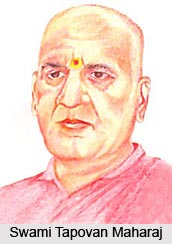 Swami Tapovan Maharaj was always considered as one of the greatest of Sanyasis and a man of total perfection, by the people of his contemporary time. He was born in an aristocratic family in the Palghat district in the year of 1889 and he was also honoured as a rare jewel icon the crown of the Himalayan peaks. He did not have any kind of interests in the worldly life from his very tender age and the life of renunciation, austerity and study became the only sacred aim of his life.
Swami Tapovan Maharaj was always considered as one of the greatest of Sanyasis and a man of total perfection, by the people of his contemporary time. He was born in an aristocratic family in the Palghat district in the year of 1889 and he was also honoured as a rare jewel icon the crown of the Himalayan peaks. He did not have any kind of interests in the worldly life from his very tender age and the life of renunciation, austerity and study became the only sacred aim of his life.
Swami Tapovan Maharaj took the decision of leaving his home and staying in the desolate forests and higher hills of the Himalayas for his austerity, study and meditation. He was very well versed with the Indian traditional scriptures and he possessed a passion for witnessing the canvas of nature`s beauty unrolling itself in the unfrequented peaks and valleys of the Himalaya Mountains, as a poet.
The experience of Swami Tapovan Maharaj`s travels have been nicely described in two wonderful books named `Himagiri Viharam` and `Kailash Yatra`, written by himself. However, the book named `Tswara Darshan` is considered as his masterpiece work and the book is actually an autobiographical sketch of his life. Another beautiful book of Swami Tapovan Maharaj has got tremendous popularity and the book is named `Wandering in the Himalayas`. He went into `Mahasamadahi` (death) in the year of 1957.
This article is a stub. You can enrich by adding more information to it. Send your Write Up to content@indianetzone.com









